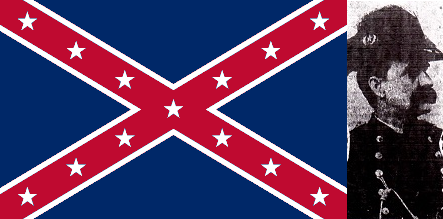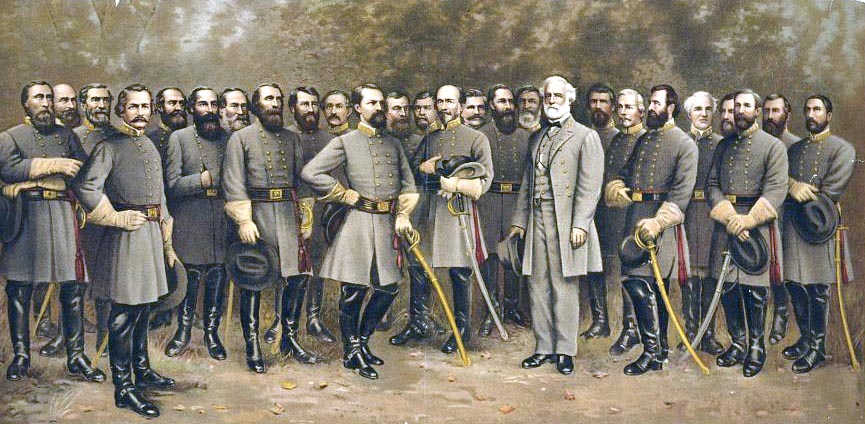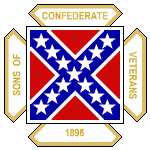
|
Colonel Ennis Ward Taylor
was born at Greenville, Alabama, September 15, 1839, and in 1846 emigrated with his parents, Dr. M. B. K. and Sarah Elizabeth (McDaniel) Taylor, to Texas, settlement being made at Jefferson, in the eastern part of the state, and his youth was spent in agricultural pursuits, plowing, hoeing and picking cotton. He attended school three months. Entering the employ of J. C. Preston & Company, druggists at Jefferson, in January, 1855, he studied the U. S. Dispensatory completely and a year and a half from that time was placed in charge of a new drug store being instituted by Dr. R. W. Walker, remaining in his employ about two years. He then started in business for himself with Dr. H. Witherspoon, under the firm name of Taylor and Witherspoon, beginning with a cash capital of seven hundred and fifty dollars, and the first year in business, 1860, young Taylor earned six thousand dollars, which he invested in Confederate property. In 1861 he sold his drug business and enlisted in the Army of the Confederate States, Company A, Nineteenth Texas Infantry, being elected major upon its organization, and in a few months succeeded Colonel R. H. Graham, resigned, as lieutenant colonel of the regiment. After the battle of Jenkins' Ferry, Arkansas, Colonel Richard Waterhouse was made brigadier general and Mr. Taylor was then promoted to the colonelcy of the regiment.Colonel Taylor's service in the Confederacy was in the Trans-Mississippi department, participating in the battles of Milliken's Bend, Mansfield, Jenkins' Ferry and many minor engagements. His regiment was on the memorable retreat from Simsport on the Atchafalaya Bayou, and finally, by junction with Green's Cavalry which had been marching from Texas, Colonel Taylor's regiment joined General Dick Taylor's command at Mansfield, where the great battle was fought. Bank's army was routed, and seven miles of wagons, caissons, cannon, hospital stores, bagged wagons and all of the necessary outfit of an army became the property of the successful Confederate forces under General Dick Taylor. After the battle at Pleasant Hill, which was fought on the day following that of Mansfield, April 9, 1864, the regiment with Walker's entire division was ordered to Arkansas to meet General Steele, and the battle of Jenkins' Ferry was fought on the 30th of April, 1864. It may be said that this was a drawn battle, as both armies pulled off and rested. The day before the Confederates entered Camden General Price ordered his regiment to cross the Ouachita river several miles below t hat city and get in between Camden and Pine Bluff to cut off their retreat, Colonel Taylor being in command of this expedition. Before he had gone many miles, however, he was overtaken and directed to march his command to the town of Camden, it having been learned that Steele had evacuated that place the night previous. He was detailed by General Kirby Smith to take command of the post at Camden, upon which he sought General Smith and asked to be relieved of that order, stating that he came to the front to fight the battles of his country, not to command posts, and through the earnest solicitation of himself Colonel Waterhouse, Brigadier General Scurry and the division commander, General Walker, he was finally relieved and allowed to go to the front. His command was detailed on the morning of April 30th to extend the skirmish line south of the advancing forces to the Saline river, and in fact brought on the battle in that part of the field. His command was then ordered back to Texas, and when Hempstead, in this state, was reached the war had come to a close. He marched his regiment across the country, keeping out guards and maintaining military discipline, disbanding each company as it came nearest its home, giving them all their company supplies, transportation and everything belonging to them. Marching on until within four miles of Jefferson, his home, the remaining part of the regiment camped there that night and in the morning marched into town. Here Colonel Taylor said to them:
"The war is now over; you owe no further allegiance to the Confederacy. You have been true and brave soldiers, now take the belongings of each company and divide them among yourselves. Go to your homes and make true and devoted citizens, as you have been soldiers of your country. Go the commissary department and carry home with you as m any supplies as you can get away with, there being quite a large quantity in that department at Jefferson at this time." The boys did go home, and have remained faithful to the stars and stripes, while today they and their descendants are devoted lovers of their country, ever ready to fight for their flag as valiantly as did those who fought to conquer the south. They with others went home in May, 1865, and fortunately it was in the spring of the year, for they found the fences all gone, houses dilapidated, families scattered here and there, but all went to work, and in the following fall brought to Jefferson eighty thousand bales of cotton, which sold for from thirty to fifty cents a pound. Thus their dissipated fortunes became greatly recuperated.
After the close of the war Colonel Taylor engaged in the drug business at Jefferson, which proved very profitable, enabling him to become interested in banks, farms, etc., and almost all enterprises brought money to his coffers. He was one of the prime movers in the construction and became vice-president of the East Line & Red River Railroad, the building of which has begun at Jefferson I 1886, the late lamented Colonel W. M. Harrison, a true and tried friend, being the president of the company. They succeeded in building twenty miles of track, for which they received from the state certificates for three hundred and twenty acres of state land. They needed money, however, and getting together went to St. Louis and procured thirty-two thousand dollars for those certificates, which enabled them to construct the road on and on until it reached Sulphur Springs, covering a distance of eighty miles. It was then sold to Jay Gould and became a part of the Missouri, Kansas & Texas Railroad. In dollars, they received one hundred and fifty-three thousand dollars, a rather large amount for amateurs in the railroad trade.
Colonel Taylor's next project was the construction of a railroad from Seligman, Missouri, to Eureka Springs, Arkansas, in which he was associated with Colonel Richard C. Kerens, Governor Powell Clayton, Morgan Jones, Stephen B. Elkins and the late lamented Logan H. Roots, of Arkansas. They succeeded in building this short road, and then began the development of Eureka Springs. The earnings of the road for eighteen months were set aside for the benefit of its development, for which was organized the Eureka Improvement Company, the building the magnificent and palace-like Crescent Hotel of Eureka Springs, a "thing of beauty and a joy forever." The pure and unadulterated waters of these springs Colonel Taylor assures us is a panacea for all ills of mankind, as it cures all blood diseases, even eradicates the cancer, and makes the blood as pure as that of an infant. His next enterprise was in the construction and maintenance of the Wichita Valley Railroad, extending from Wichita Falls, Texas, to Seymour. He was vice-president of this company, associated with Morgan Jones, General G. M. Dodge and the lamented Walters of Baltimore. The road was duly constructed, and is today in a fine condition, with a good earning capacity. It runs through the finest wheat country in the world, every acre of which in ordinary seasons will double its value in dollars and cents with almost every kind of crop planted. He feels justly proud of the Wichita Valley Railroad and its success.
Colonel Taylor established his home in Fort Worth in 1888, and has ever since lived in this city, closely identified with all its varied interests, of which he has been a generous supporter, both in money and influence. He retired from the banking business in 1891, since which time he has lived in retirement, although he is now president of the United Benevolent Association, a fraternal order organized at Fort Worth and chartered by the state of Texas on the 7th of November, 1895, it having since paid to its beneficiaries, the widow and orphans, two hundred and fifty thousand dollars. This is an assessment order, based on the Fraternal Congress table of rates. It is self-sustaining, and in this institution a man or woman pays just what it costs to carry their insurance, as the association prefers to have the reserve in the pockets of its devoted membership. It is on a solid basis financially, paying its beneficiaries very promptly upon proof of death. He has always taken a deep interest in politics, but not as a seeker after public preferment. He was elected mayor of Jefferson over the celebrated Malloy, since which time has not chose to become a candidate for any public office. He is a member of the Board of Equalization in Fort Worth, commander of R. E. Lee Camp, U. C. V., also lieutenant colonel on the staff of Major General Van Zandt, state department U. C. V. He became a church member when twelve years of age, and is now identified with the First Methodist Episcopal church, South, of Fort Worth. He has passed through all the degrees of Masonry to and including the Knight Templar, and is a Shriner.
Colonel Taylor was married at Jefferson, Texas, February 1, 1859, to Miss Fannie Fisher, and to them have been born three children, but two eldest, a son and daughter, died in their infancy, the only surviving heir being Mrs. Louise Taylor Connery. This daughter was educated in Boston at the Peter Sillia Academy of Music, and while there became a devoted member of Bishop Brooks' Trinity church. It was also in that city that she met her husband, C. W. Connery, a native of Boston, but now a merchant of Fort Worth.

